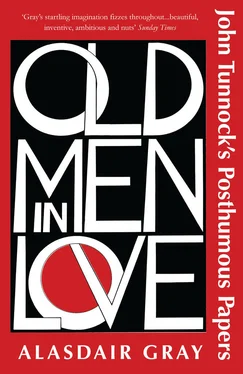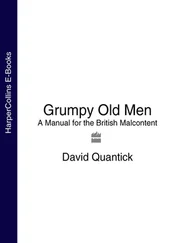She paused and stared grimly at the headmaster who sat with hands clasped tightly on the desktop, frowning and chewing his under-lip. A short silence was broken by Nell saying faintly, “In France, I believe …”
“Yes, be quiet Nell,” said Nan. “In France until recently brothels were licensed and kept free of disease by medically-qualified municipal inspectors, so unmarried youths with some cash could easily obtain sexual relief, often with parental approval. In modern Britain, alas, most adults are still too Victorian to teach their children the facts of sex. Nell and I are examples. We read Marie Stopes and D. H. Lawrence yet were too shy to tell our nephew John about the act of penetration and use of contraceptives. Your science teachers are equally reticent. I entered this office today fearing the worst and am glad to know John has only been purchasing aids to masturbation. Every woman who washes teenage boys’ underwear knows how often they masturbate. You must have done so when you were that age. There is no point discussing something so commonplace or making a fuss about it. Modern doctors now know it does not induce blindness or soften the brain.”
This speech made me realize there was some connection between the pale grey jelly with which I stained my underpants four or five times a week and the phenomenon of birth. After quite a long silence the headmaster pointed to the two magazines and in a distant-sounding voice said, “You think these aids to masturbation should be openly passed around among my pupils?”
“No. It was silly of John to trust poor Doig with them, but please bear in mind that this was on Saturday when the boys were not legally under your administration. He will not give such publications again to Stewart Doig or anyone else — will you John?”
“No! No! Never!” I almost shouted.
“Mr MacRae, I sympathize with the dilemma Mrs Doig has forced upon you. Her complaint cannot be ignored, yet a big fuss about it will be bad for the school. You know that last week a daft Church of Scotland minister made a story for the Glasgow Evening News by denouncing pupils of Glasgow Girls’ High School for conversing with boys during lunch hour in a Sauchiehall Street espresso café. A gutter journalist could keep such a story running (as they say), if he heard of this equally innocuous Hillhead Secondary boy’s misdemeanour. He would tell easily shocked clergy and parents about him and quote their reactions under headlines with shock and sex and horror in them. He would pester you for an opinion and if you did not say you had dealt with John by savagely punishing him you would be accused of being permissive — a cant word now current in the gutter press.”
“That,” said MacRae grimly, “is what I mean to prevent.”
“But you cannot possibly use the tawse on such a good, obedient, hard-working pupil as John who has never defied his teachers and the Hillhead rulings in any way at all. We have told John that if any teacher so much as threatens him with the belt he must walk out of the school and come home. If he does so we will send him to Kilquhanity 33— a really permissive school — what a tit-bit for journalists that would be. I expect you will write to poor Stewart Doig’s mother saying you have taken firm steps that ensure John will never again lead Stewart or anyone else into temptation. That is all you need do. Let us now agree to forget this sorry business. Please treat these publications on your desk as waste paper for their sexual aroma is not open or clean. John has never brought material like that to Hillhead Secondary and won’t give it to anyone else. You have taught him a lesson he will not forget.”
The headmaster said abruptly, “Good,” and stood up. So did my aunts. He asked what class I should be attending. Maths, I told him. He said, “Go to it then. You have a remarkable aunt, John Tunnock,” — (adding with a polite nod to Nell) — “aunts, I mean. Don’t let them down again.”
I had always loved Nan but before this interview had thought her an ordinary old lady. I was so astonished and braced by her words that I said firmly, “Thank you Sir! Never again Sir!” I stepped up to the desk and held out my hand to him. After the briefest of pauses he held out his own. We shook, then he grunted, “Off you go Tunnock.”
We walked in silence from the Headmaster’s office until, turning a corner, Nell started laughing and said, “You were wonderful Nan.”
Nan said, “Yes, I astonished myself, especially with my lie about telling John to leave school if threatened with the belt. I’m glad you recovered your confidence at the end, John, but sorry your pal has let you down.”
I wiped what felt like a wide grin off my face and said firmly, “He is no longer my pal.”
They looked at each other and sighed because they thought I should forgive Doig’s honesty to his mother, but said no more about the matter nor ever spoke of it again. They must have known that discussing masculine inclinations with a male is useless. My purchases of pornography became rarer from then on. My erotic fantasies found enough to stimulate them in maturer literature and visits to the Hillhead Salon and Grosvenor cinemas. And ever since then I have loathed the taste of sherry and drunk alcohol cautiously.
But before going home that day I approached my usual classroom very dourly, knowing the teacher at least would know I came from the headmaster’s office and why I had been summoned there. I later learned that the whole school knew why: earlier that morning in the playground Doig had been surrounded by a crowd of urgent questioners and, unused to such popularity, had told everything. I entered the room halfway through a geometry lesson and the teacher fell silent in the middle of a sentence. By an effort I think I managed to look thoughtful, even absent-minded, as I walked between staring faces to an empty desk. From my briefcase I removed my Euclid and exercise book then sat with hands clasped on them (as the headmaster had clasped his) and looked enquiringly at the teacher who, with heavy irony said, “Have I your permission to continue, Tunnock?”
“Certainly, Sir! Certainly!” I said, and from that moment my reputation as a swot and a snob ended. Classmates who thought I had been savagely belted were astonished by my composure, the rest knew something unimaginable had happened. When questioned afterwards in the playground my only words were, “MacRae is not a barbarian. We reached an agreement and he dismissed the matter as a storm in a teacup.”
When several boys asked me to supply them with dirty books and offered to pay more than the purchase price I smiled thinly and said, “No no. Once bitten, twice shy.”
But how had two gentle spinsters born in Victoria’s reign (Nan 1897, Nell 1900) become so broad-minded without me noticing before the Stewart Doig catastrophe? The 1914-18 war must have changed them as it changed many others. When Nell heard a pipe band playing on the wireless she was inclined to weep. Nan told me privately this was because in 1914 young soldiers marched behind bands between cheering crowds from Maryhill Barracks to the train that would take them on the first lap of their journey to the Flanders slaughterfields. That kind of public jubilation cannot have lasted much more than a year, even though most British private businesses profited by that war. I do not know if Nell lost a sweetheart in it, but many young women of my aunts’ and Miss Jean Brodie’s generation were deprived of potential husbands and their faith in a God praised in churches because he had made Britain victorious. Jean Brodie became a Fascist but was exceptional. More folk turned to Socialism, my aunts among them. It had broadened their minds without changing their behaviour, hence my astonishment when Nan firmly dominated a Scottish headmaster. Being Socialists they were ashamed of having a house much larger than they needed, and living upon rents from two tenement blocks in Partick inherited from their father. Before 1939 this income let them employ a cook and housemaid. When these were directed into war-work they managed without, and like most middle-class folk after the war could not afford servants. Unlike many they never complained.
Читать дальше












